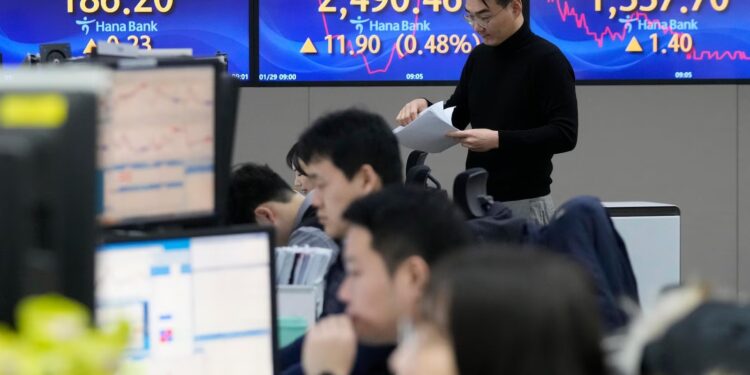Asian markets opened the week on a weaker footing, with major indices across the region slipping in early trading on Monday. Investors reacted to renewed trade tensions and lingering uncertainty over global economic conditions, dampening appetite for risk.
In Tokyo, the Nikkei 225 dropped by 1.57% to close at 37,370.42, weighed down by losses in tech and industrial stocks. Hong Kong’s Hang Seng Index saw a steeper decline, falling 2.20% to 22,778.45 as geopolitical tensions and persistent property sector concerns continued to drag sentiment.
South Korea’s KOSPI also slipped in early trade, reflecting broader caution across Asian bourses. Analysts noted that the sell-off was in part triggered by fresh tariff threats from the United States, where former President Donald Trump pledged to double tariffs on key imports such as steel and aluminium if re-elected. The announcement revived memories of the US-China trade war, rattling markets sensitive to export outlooks.
Chinese markets remained closed for a public holiday, limiting regional liquidity and reducing trading volumes. Despite this, traders continued to factor in signals from Chinese economic data released last week, which showed mixed industrial and manufacturing output.
Indian markets also mirrored the regional mood. The BSE Sensex declined by over 750 points to settle at 80,701.33, while the Nifty 50 index slipped below 24,550, dragged down by auto and banking shares. Domestic investors remain alert to global developments as well as forthcoming interest rate decisions from the Reserve Bank of India.
Currency markets in Asia were largely steady, though the Japanese yen strengthened slightly against the dollar as investors sought safer assets. Oil prices also edged lower, reflecting concerns over demand in the face of potential trade disruptions.
Market participants are now looking ahead to key economic indicators due later this week, including US non-farm payrolls and updated inflation figures. Central banks across the region are also due to meet in the coming days, with traders hoping for clearer guidance on monetary policy paths.
Overall, Monday’s trading session highlighted persistent investor unease, as markets continue to navigate a complex web of economic and political risk heading into the second half of the year.
newshub finance



Recent Comments